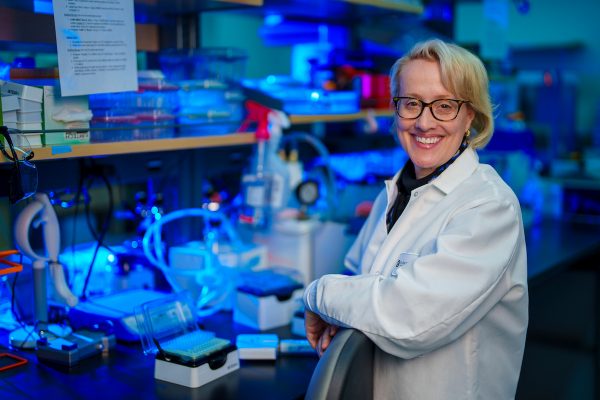Patients, clinicians and researchers have long dreamed of treating pain with opioids without the risk of addiction. A transatlantic collaboration led by Vanderbilt University and the University of Glasgow may bring that vision closer to reality.

Photo: Harrison McClary/Vanderbilt University
Great Britain’s Wellcome Trust has recognized Vanderbilt’s Carrie K. Jones and the University of Glasgow’s Andrew Tobin with their prestigious Discovery Award. The pair will study how blocking the M5 muscarinic receptor in the brain counteracts opioids’ addictive properties, which could lead to new treatments for preventing or addressing opioid addiction. Jones is an associate professor of pharmacology and director of in vivo pharmacology and development at the Vanderbilt Warren Center for Neuroscience Drug Discovery; Tobin is professor of molecular pharmacology and director of the Advanced Research Centre.
This joint project is based on Jones’ exciting preliminary research showing that inhibition of the M5 receptor by small drug-like molecules developed by Craig W. Lindsley, director of the Warren Center for Neuroscience Drug Discovery, significantly reduces the addictive properties of opioids without altering their pain-relieving actions.
“Carrie’s achievement underscores the importance of the pathbreaking research at the WCNDD and the critical role they play in addressing global health challenges,” said Padma Raghavan, vice provost for research and innovation and chief research officer at Vanderbilt. “Her collaboration with Dr. Tobin and their work on M5 receptors holds extraordinary promise for advancing addiction treatments—showcasing how visionary research can lead to real-world solutions.”
Jones is the first Vanderbilt researcher to receive a Wellcome Trust Discovery Award. The £5 million ($6.2 million) grant will support multidisciplinary preclinical studies to uncover how M5 receptor inhibitors affect the molecular, pharmacological and physiological processes linked to opioid addiction. By blocking these receptors, the team hopes to stop the addictive effects of opioids without reducing their ability to relieve pain in patients.
“We have been given a huge opportunity through the award of this Wellcome Trust grant to achieve what has been the dream of clinicians worldwide for many years,” Jones said. “Our work on the M5 receptor is key to making this dream a potential reality.”
The next challenge is deeper understanding of this molecular discovery and translating that into viable treatments.
Tobin’s experience with similar receptor studies strengthens the team’s efforts. “We believe that developing new medicines that inhibit the M5 receptor, which can be taken alongside prescribed opioids, will be key to the safe use of opioid analgesics,” he said.
Many people develop opioid addiction after using prescribed pain relievers like morphine, codeine and oxycodone after surgery or injury. In the U.S. alone, more than 2.7 million people have opioid use disorder, while in Scotland, opioids are involved in more than 80 percent of drug-related deaths.

Photo: Harrison McClary/Vanderbilt University
“There are sadly few people who do not have a personal connection to the global addiction crisis. Fundamental discoveries made at the Warren Center and in the Jones and Tobin labs are essential to understanding the roots of addiction so that they can be eliminated,” said John Kuriyan, dean of the Vanderbilt School of Medicine Basic Sciences. “The research supported by this funding will have significant impacts on how individuals suffering from opioid use disorder will reclaim a life free of addiction.”
The Warren Center for Neuroscience Drug Discovery works to advance groundbreaking discoveries about human disease and drug targets to a stage where they can directly improve patient care. The center aims to “de-risk” novel approaches for treating serious brain disorders by generating as much foundational data as possible early on to ensure the success of later-stage developments.
“The WCNDD has spent many years developing the best-in-class small molecule M5 tool compounds to study and de-risk the actions of the M5 receptor, and I am thrilled to have established therapeutic potential for opioid misuse and addiction in collaboration with Carrie and her research team,” Lindsley said. “It is truly wonderful to further solidify our long-standing collaboration across multiple muscarinic targets with Dr. Tobin under this new Wellcome Trust Discovery Award.”
Beyond its transformative potential in addressing the global opioid crisis, this project highlights the importance of diversified funding sources for Vanderbilt researchers. The support enables the team to thoroughly investigate the science behind potential breakthrough therapies, even if clinical trials are still years away.
The Wellcome Trust, a global charitable foundation, typically focuses on U.K.-based projects. This grant demonstrates Vanderbilt’s expanding global footprint in research and innovation—especially in addiction research and health care.
